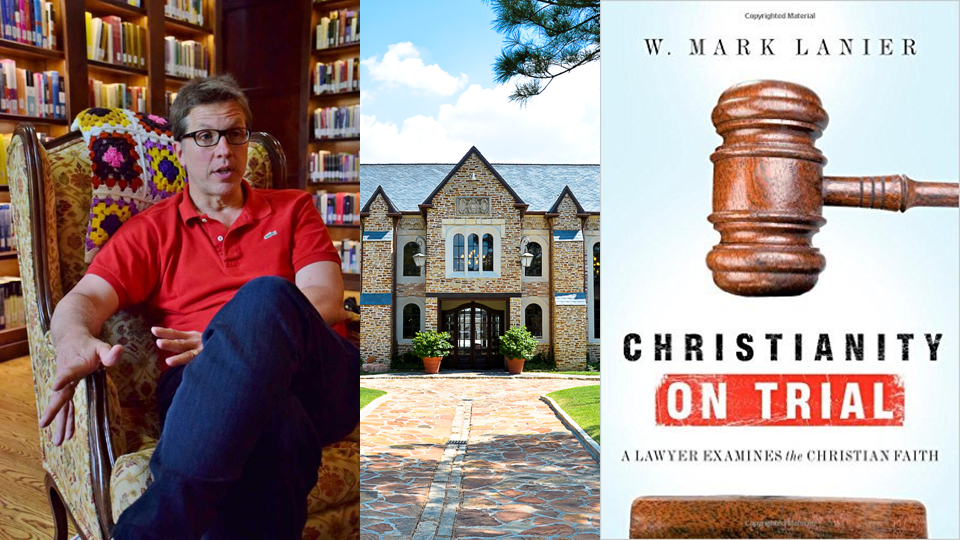
Esta entrada también está disponible en: Spanish
=Follow/Sigueme=
=Share/Comparte=
Recently I had the undeserved privilege to interview an outstanding Bible teacher, author, father, husband, and friend who also happens to be one of America’s top trial lawyers. He is not only exceptionally skilled at defending his clients in court; he also defends his Christian faith daily.
Mark Lanier is an attorney and founder of the Lanier Law Firm. U.S. News and World Report’s Best Lawyers named him to its Best Lawyers in America list for nine consecutive years and as the 2013 Top Class Action Attorney in America. His courtroom work has been featured in The Wall Street Journal and The New York Times, and he is a frequent guest on CNBC and Fox Business News. He is the founder of the Lanier Theological Library and teaches biblical literacy at Champion Forest Baptist Church in Houston, Texas; my beloved Church as well. Mark’s classes are recorded for public consumption at www.biblical-literacy.org and I have the privilege to teach his material in Spanish at Church, also available at www.veritasfidei.org/estudio. Mark is the author of the excellent book, Christianity on Trial: A Lawyer Examines The Christian Faith.
Now, the discipline of “giving reasons” for our Christian faith is called Apologetics. Apologetics is not about “apologizing,” but about lovingly and respectfully responding to objections or questions related to Christianity so that people can properly grasp the gospel message. I see apologetics as the task of removing obstacles so that people can clearly see the cross of Christ. Here Mark responds to some key questions about teaching apologetics and defending the Christian faith. Enjoy!
- Why do you teach apologetics to your students?
ML: I think everyone needs to know the rational reasons behind their faith. We live in a world that lobs “educated” grenades against the faithful, constantly suggesting that belief in God and the Christian faith is only for those who are too uninformed, uneducated, or unwilling to think. Believers need to be able both to withstand that onslaught and be armed to counter it in order to reach the lost.
- How do you teach apologetics uniquely to your students? (This is a question about methodology)
ML: To me, almost all teaching is attached to apologetics. One could compare it to a concrete that holds bricks together. So I find that most anything I teach fits into the apologetic principles that make sense to me. It is easy to tie most teaching in to show how it fits into the Christian worldview that best explains the world and the way we see it/experience it.
My apologetical teaching is not one of creationism vs. evolution, or young earth versus old earth. Mine is very much a presuppositional apologetic. I try to explain that we have key questions that deserve answers: Why is there objective right and wrong? Why do I believe in love as something more than a chemical reaction? Why do I believe people are more than a bag of chemicals? I.s., what is it that makes humanity valuable? (Why aren’t we all cannibals?) The best explanation for the way we are and the way the world is is that found in the Biblical worldview. It makes more sense than any of the other options. It is the one worldview consistent with people’s lives. I have yet to find an atheist who can live consistently with that worldview. For that matter, I’ve yet to find one who would want to!
- How frequently do you teach apologetics, and in what way?
ML: I wind up referencing apologetics almost every lesson, simply because it is a constant theme that for me is a worldview. So in every lesson, I try to show how whatever I am teaching fits into the larger whole perspective.
- How do you motivate students to care about apologetics?
ML: I find motivation goes hand in hand with what they care about. Whether it’s reaching a loved one who is questioning, or answering one’s own doubts and questions, I find people motivated when it means something to them.
- Do you also focus on equipping parents? If so, how?
ML: ABSOLUTELY!!! The next generation is always the biggest challenge. Especially in our Internet age where people get exposed to more ideas than ever before; where people can appear to be experts, even though they aren’t; and, where knowledge is broad and shallow. I teach parents that they need to engage in dialogue with their children, that they need to know well for themselves why they believe, and that they need to make the subject a discussion point, even though children might not bring it up on their own.
- What barriers do you run into when trying to teach apologetics? How do you address them?
ML: I really haven’t run into any barriers. Sorry!
- What mistakes have you made when teaching apologetics?
ML: The same mistakes I make teaching anything! Sometimes I am not clear. Sometimes I have not thought it through as much as I should have. Sometimes I am insensitive to where people are.
- What resources do you use when preparing an apologetics-focused message?
ML: I read everything I can that interests me. I try to chase down my own questions. I try hard to interact with as many people as I can, especially unbelievers and people who are questioning. I have a good base for why I believe, so some of my greatest “need” in preparation is finding where others are and how they “hear” my answers. Then I am best prepared to teach the bigger general audience that doesn’t have the one-to-one interaction.
- What are the biggest questions youth leaders need to address to equip students?
ML: I polled a class of 45 college student last year. These were students who were in a class on how to share your faith. Now you would think that they are firm in their faith if they want to take an elective about sharing it. My poll was secret. They wrote on pieces of paper their own greatest challenges to faith and, without signing them, passed them to me. The results were amazing. The largest group was centered on the age old question, if there is a God, then why do bad things happen?
- What does your teaching scope and sequence look like for a particular year, or on a multiple-year plan?
ML: It is always thematic on something, and almost always textual. Beyond that, it varies greatly and really can’t be identified in an answer.
- How do you incorporate apologetics into your bigger plan for developing students?
ML: It’s always on my mind, so it’s always in my teaching. Only once in the last ten years have I targeted as series on apologetics. It just fits into most everything I teach. In that way, I want the student to make it an everyday part of who they are. It’s not a one course chance to learn and then hold onto. Challenges to faith are daily. Defenses to faith should be as well.
I am profoundly thankful to Mark for his time and dedication to teaching truth and defend the Christian worldview.
We destroy arguments and every lofty opinion raised against the knowledge of God, and take every thought captive to obey Christ. 2 Cor. 10:5





